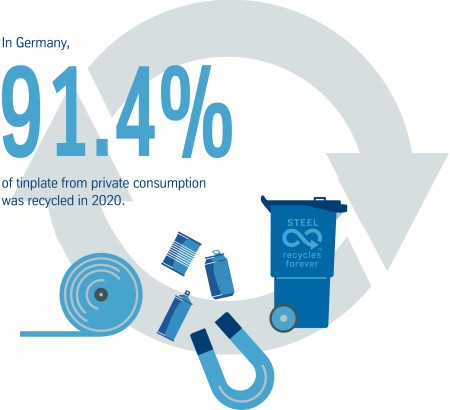Daily press, 2022-02-15, 01:00 pm
91.4 percent of tinplate packaging from private consumption recycled
In Germany, 91.4 percent of tinplate from private consumption was recycled in 2020. The recycling rate for total tinplate consumption has also been stable at around 90 percent since 2006. These findings were published by the Gesellschaft für Verpackungsmarktforschung (gvm) in its recently published annual recycling report for packaging.
“Tinplate proves once again that it is a sustainable packaging material in a closed, well-functioning material loop. It can be recycled over and over again without losing its inherent properties,” says Dr. Peter Biele, CEO of thyssenkrupp Rasselstein GmbH. “A tinplate can, a twist-off closure or a crown cork can be recycled after use and made into a new, high-quality steel product as part of a wind turbine, car component or a bicycle part.”
Almost 100 percent of tinplate can be recycled in a high quality
Tinplate has a compelling advantage over many other packaging materials: it is almost 100 percent recyclable. The characteristic properties of this metal allow steel to be melted down over and over again and be processed with pig iron from the blast furnace to produce crude steel and then be made into a new steel product.
“For this to be possible, tinplate must be disposed of properly— here the ball is in the consumer's court. Empty tinplate packaging belongs in the yellow bag or in the yellow garbage bin. This is the only way to ensure that steel packaging will also return to the material cycle,” says Biele.
thyssenkrupp Rasselstein GmbH itself is helping to effectively close the material loop by ensuring packaging steel is recycled in Germany using its own recycling systems: DWR - Deutsche Gesellschaft für Weißblechrecycling mbH for the private sector and Kreislaufsystem Blechverpackungen Stahl GmbH for the commercial/industrial sector.
2020 was a special year overall—marked by the onset of the COVID-19 pandemic. For example, according to the gvm report, consumption of food cans increased 9 percent due to COVID-19 because households stockpiled more. The consumption of chemical-technical packaging even increased by 16 percent as the DIY market flourished during the same period.
As of the 2020 reporting period, the calculation of the recycling rate has been modified by gvm in accordance with the European Implementing Decision EU 2019/665.





